17 Biggest Lies Parents Always Tell Teachers

No parent wants to start the school year off on the wrong foot. So, in an attempt to make their kids look good—and to make themselves look better as well—parents tend to tell teachers those little white lies we’re all guilty of uttering. But the truth is, any educator can see right through that project you just “helped” your kid with, or your excuses for being late for the field trip on Tuesday morning. To avoid giving yourself away, we’ve rounded up the biggest lies parents try to get past their children’s teachers every single year, direct from those who give them and those who hear them.
1
“They never act this way at home.”

If your child is misbehaving at home, they’re probably not suddenly acting like a perfect little angel in the classroom. But it’s nothing to be ashamed about. When the unfavorable behavior comes up with your child’s teacher, don’t lie and act like you’re in the dark. Instead, work with your child’s team at school so you can find a solution together.
“Figure out the root of the behavior without excusing it and come up with strategies to help,” writes Kimberly Valzania on the popular blog Scary Mommy. “Working with—instead of against—teachers and administrators is a key strategy for correcting behavior.”
2
“They didn’t have this problem last year.”
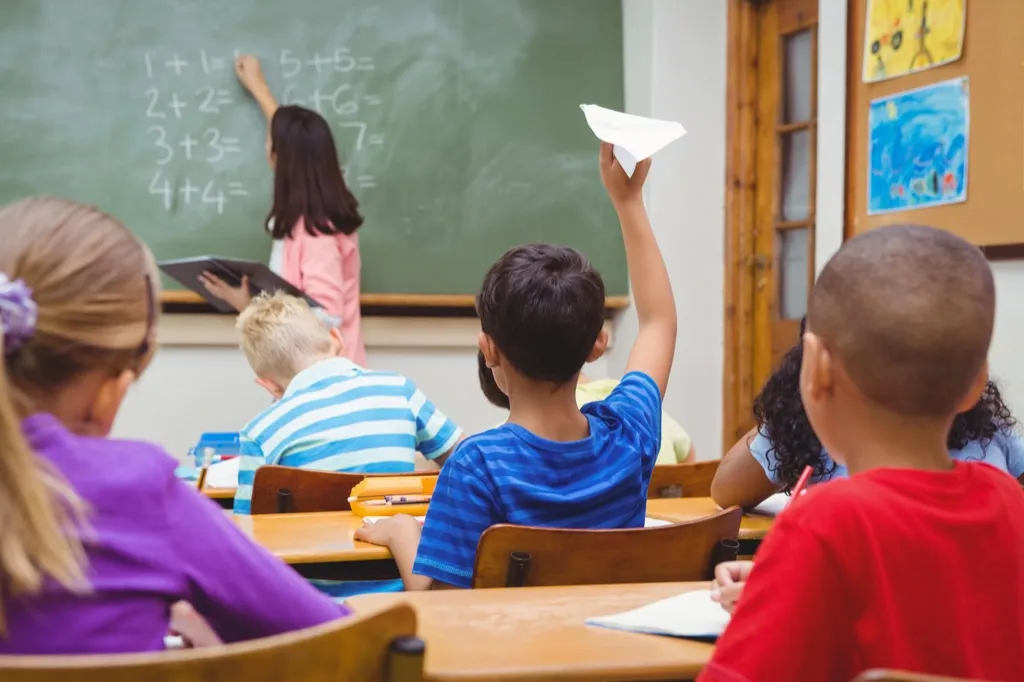
Teachers talk. And it’s not hard to find out whether or not your child was a problem student in their previous class—after all, they can just ask about your kid in the teacher’s lounge. So don’t try to hide or lie about your child’s issues. Doing so only leads to distrust between parents and teachers, which causes problems for the student ultimately.
Charles M. Payne, a professor at the School of Social Service Administration at the University of Chicago, examined this relationship in his book So Much Reform, So Little Change: The Persistence of Failure in Urban Schools. According to Payne, a lack of trust among teachers and parents creates dysfunction in schools, undermining high-quality education. So, being honest with your child’s teacher, even if that means revealing bad behavior, can actually help your child succeed.
3
“We don’t curse at home.”

No parent condones their child cursing, but they did learn those bad words from somewhere. And no matter how much you protest, your child’s teachers know you’re the likely culprit. In fact, it’s scientifically proven! Research from the Massachusetts College of Liberal Arts in 2012 found that kids are learning to swear at an earlier age and that they do so more often than they did just a few decades ago. The reason? The rise of cursing among adults.
“As soon as kids can speak, they’re using swear words,” study co-author Timothy Jay explained in the report. “That doesn’t mean they know what adults know, but they do repeat the words they hear.” And even though parents may have rules against swearing at home, nearly two-thirds of the adults surveyed admitted to breaking their own rules about cursing—sending the child mixed messages about what language is appropriate and what’s not.
4
“They go to bed every night at 8 p.m.”

Sending your child to bed promptly at 8 p.m. every night might be your goal, but it’s likely not your reality. After all, the National Sleep Foundation reports that only about 15 percent of teens are getting the necessary amount of sleep each night, so chances are high your kid makes up the other 85 percent. If their teacher asks why their eyes are barely open during first period, don’t make up a lie to hide the truth. Use it as an opportunity to ask your child’s teacher for advice on making those bedtime dreams a reality.
5
“We check their folder/agenda every night.”
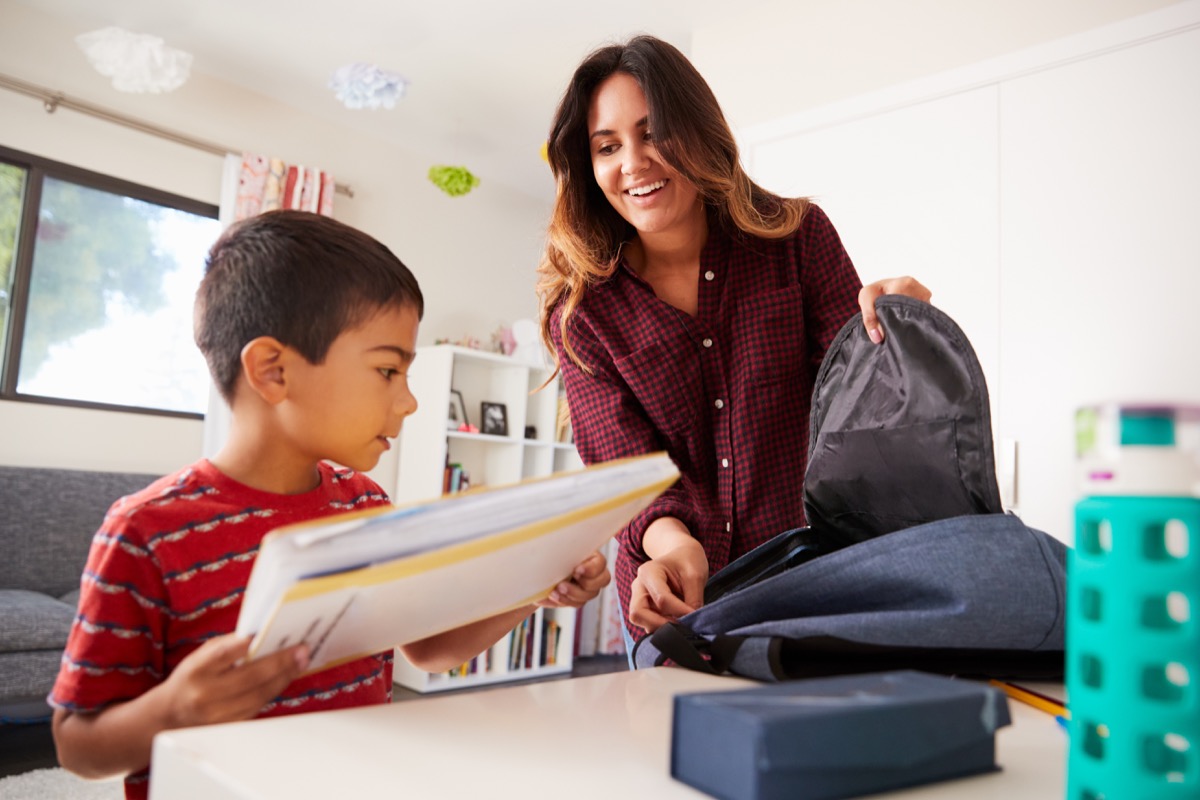
Teachers know when you’re not taking an active role in your child’s education, especially when you lie about checking their folder or agenda nightly. And when you complain that you didn’t know about some assignment that was due, you’re giving yourself away.
If you are in fact taking a backseat role in your child’s education, consider that a 2010 study published in the journal Child Development found that students ended up having fewer behavioral issues and better social skills when their parents were more involved in their schooling.
6
“My kid was a straight-A student before this.”
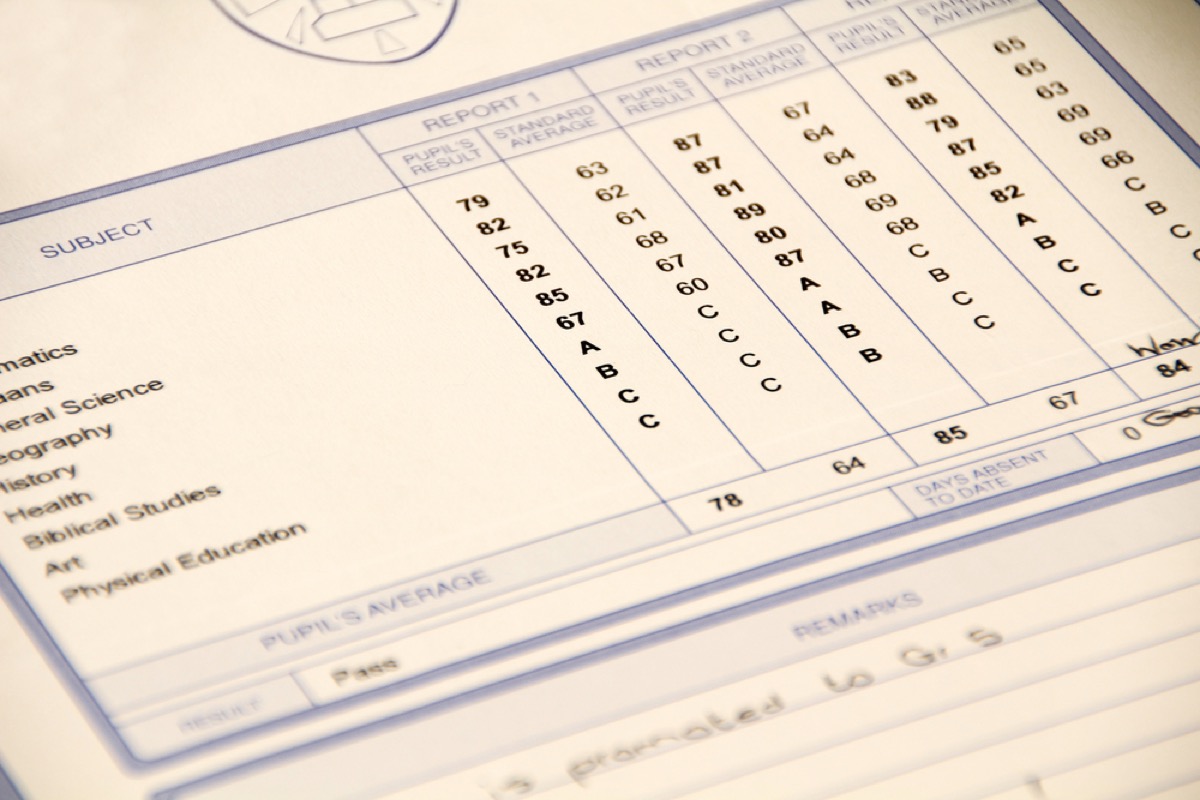
Firstly, your child’s teacher can easily pull up their report cards from the previous years, so lying about grades is practically asking to get caught red-handed. Secondly, consider that being fixated on perfection is actually detrimental to your child’s education.
“Claiming your child’s grade is unacceptable because they have historically been an ‘A’ student demonstrates an unrealistic standard of performance for the child, as well as a sense of entitlement that teachers will instantly find off-putting,” says Katie R., an English teacher in Connecticut. “Most teachers today spend a great deal of time creating rubrics to evaluate which standards have or have not been met by a given student as their acquire new skills in the classroom—grades are not given arbitrarily. Parents should review these rubrics so that they can see exactly where and why their child lost points.”
7
“They were fine this morning.”
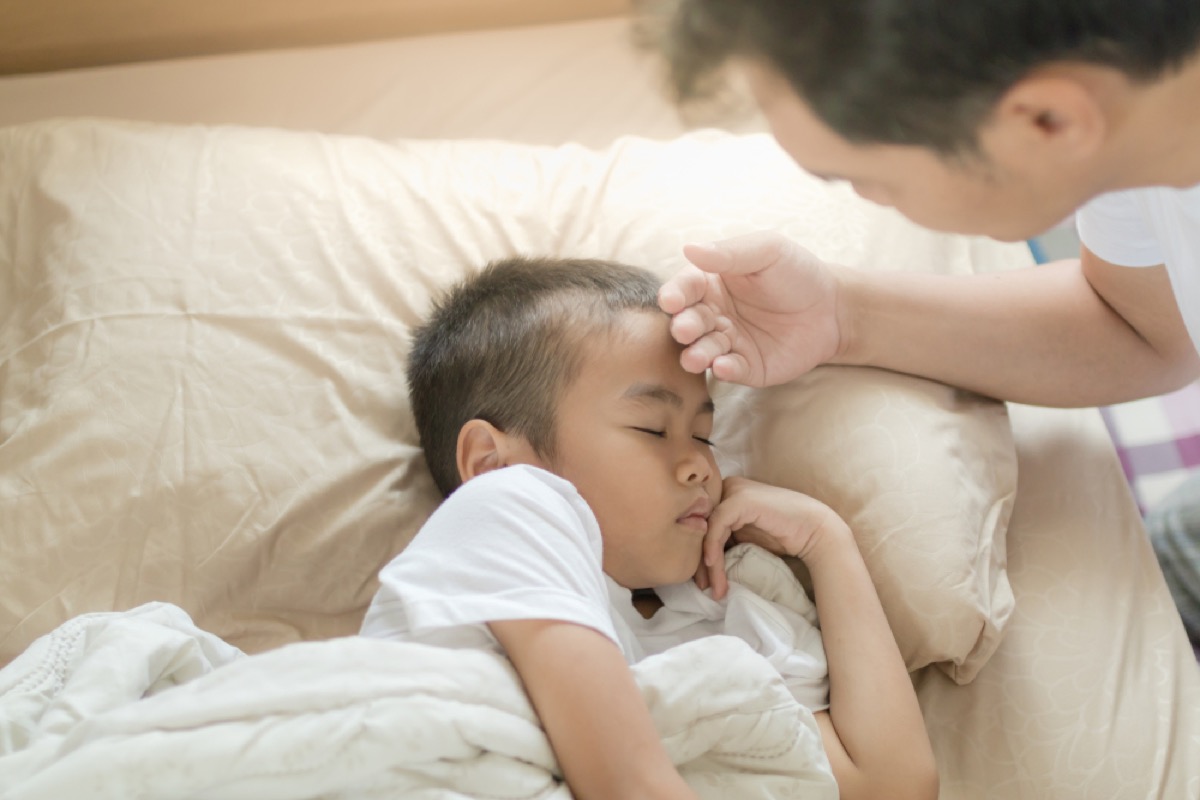
Parents may not be eager to let their children miss school, but pretending like you didn’t hear that cough before they hopped on the bus is more than a harmless fib. If your child is coming down with something, don’t send them to school sick and lie to their teachers about it. Not only does it not allow your child to rest and get better, it also puts other students at risk. Illness like the stomach flu, pinkeye, and strep throat are highly contagious. So once one kid roams the halls with any of these illnesses, it just gets passed around and around.
8
“No, my kid doesn’t have lice.”

Just like you shouldn’t lie about strep, you also shouldn’t stretch the truth about lice. And you have no reason to: According to the Centers for Disease Control and Prevention (CDC), head lice is a common nuisance among children that doesn’t reflect on their personal hygiene.
Since head lice is so easily transferred from one head to another, many school zones—like New York City—have a “No Head Lice” policy where students who have live head lice are excused. Keeping your child at home until they are free of any critters is best for the entire educational community.
9
“They’re not in front of a screen often.”

In 2010, a Kaiser Family Foundation survey of 2,000 school-aged kids found that children’s screen time averaged almost eight hours per day. So, if your child’s teacher asks about screen time and you say far lower than that number, they may suspect you’re lying. Instead of trying to make yourself look good, give your child’s teacher an opportunity to help you find a solution to getting your kid to put down the iPad and pick up their reading book.
10
“They did this all by themselves!”

While there are many talented children in the world, no teacher would believe that your non-artistic kid suddenly became Leonardo da Vinci overnight. There’s no harm in helping children with their school projects, but teachers know when that diorama is mostly the work of a parent.
“When we ‘help,’ we need to evaluate if we are helping for our kids’ sakes, or for our own gain,” Wendy Wisner writes on Scary Mommy. “It serves no one for parents to do their kids’ projects themselves. Eventually, kids need to learn to do things themselves, in their own ways—even if it means their work will be less impressive.”
11
“I just don’t have time for a parent-teacher conference.”

Any teacher knows the struggle of a busy schedule, and they know that parents do, too. However, don’t use that as an excuse to get out of meeting with your child’s teacher. Most teachers are more than willing to make time to meet with their student’s parents, even if it means stretching their own schedules to do so. But if you’re unwilling to meet them in the middle—and you’re lying about it—that doesn’t sit well with teachers, which could be detrimental to your child.
Research from the University of Missouri in 2016 found that teachers’ perceptions of their students’ parents play a part in the student’s success. “If a teacher has a good relationship with a student’s parents or perceives that those parents are positively engaged in their child’s education, that teacher may be more likely to give extra attention or go the extra mile for that student,” Keith Herman, the study’s co-author, said in a press release. “If the same teacher perceives another child’s parents to be uninvolved or to have a negative influence on the child’s education, it likely will affect how the teacher interacts with both the child and the parent.”
12
“We were late because of a flat tire!”

Everyone runs a little late now and then, but if you’re throwing out the “flat tire” excuse to your child’s teacher every month, they’re eventually going to think you’re the parent who cried wolf.
Instead, work on productively introducing routines that will help get your child to school on time. From packing backpacks the night before to creating a morning music playlist to raise spirits, there are plenty of ways to get things moving. And it’s best to get cracking now since some schools have started fining tardy students.
13
“My kid will be out of school for an important family obligation.”

Yes, teachers do find it disruptive when students are absent too much, but don’t let that stop you from fessing up when necessary. If you plan a vacation for your little ones, just be honest about it. Teachers understand that family time is important and they’re usually willing to help out, so long as parents don’t lie about why their child will be absent.
“The school is not going to take you to truancy court for going to Disney World for a week. Take the vacation,” Amy Scott, an eighth grade teacher in North Carolina, told Slate. “Get your kids to collect their assignments ahead of time and work on them in the car or on the plane.” However, Scott does warn that asking for class work ahead of time creates more work for the teacher, so make sure to thank them or even get them a tiny gift to show your appreciation for their extra work.
14
“That’s definitely my signature!”

Sometimes, a parent’s lie to protect their child only comes back around to bite them. One teacher revealed on Reddit that their colleague faced a difficult situation with a middle school student who forged his father’s signature on a failed test. And surprisingly, when the teacher confronted the parent, he lied as well to cover for the child.
But when the father complained to the teacher about a big school project he claimed he was never informed about, the teacher had proof: He “signed” the papers sent home with students explaining the project, so he was backed into a corner. Moral of the story? Don’t lie to protect your child, especially when it comes to them forging your signature.
15
“My kid’s previous school/teacher was the problem.”

Scapegoating former schools or teachers is a problem for two reasons: 1) It’s likely not the whole truth, and 2) It’s not going to be encouraging to your child’s current teacher. In fact, this might actually put you—and unfortunately, your child—in a negative light with their new educator.
“This can set off some alarm bells for teachers because the common denominator in a long history of negative experiences with schools seems to be you and your child,” says Katie R. “Plus, it speaks volumes about your attitude towards educators and school systems in general.”
16
“We didn’t have money for school supplies.”
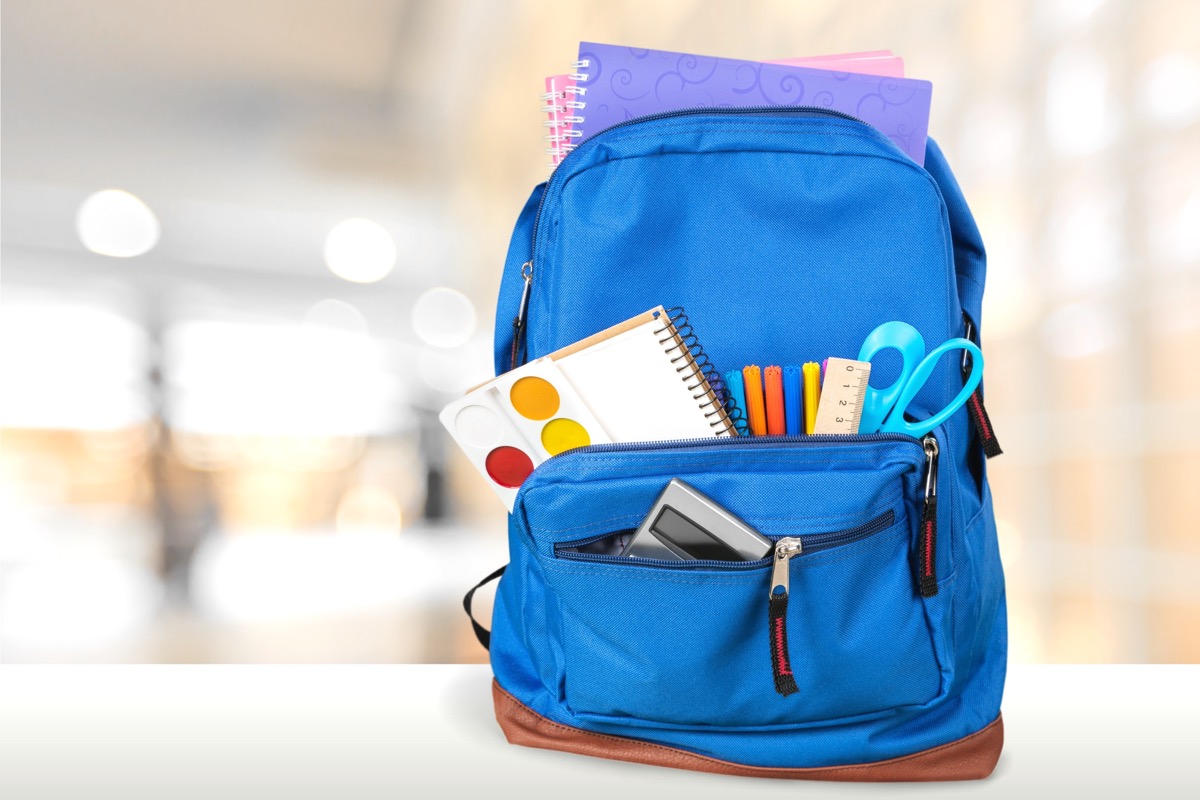
There are plenty of families unable to provide the funds for school supplies, and usually, teachers are more than willing to help. But they also know when you’ve simply skipped the shopping trip and are falsely blaming it on funds.
“If you tell us you don’t have money for school supplies or field trips, but yet, your kid has money every day for ice cream at lunch, we know,” says one South Carolina elementary school teacher.
17
“My kid never lies!”

Everyone lies—even your child. And your tendency to lie to your child’s teachers about it is where it comes full circle. Research published in the journal Developmental Science in 2014 showed that children who witnessed the adults in their lives lying tended to lie more themselves. “All sorts of grown-ups may have to re-examine what they say to kids,” study author Leslie Carver said in a statement. “Even a ‘little white lie’ might have consequences.” And for things parents should never lie about in general, check out the 25 Things You Should Never Lie to Your Children About.
To discover more amazing secrets about living your best life, click here to follow us on Instagram!